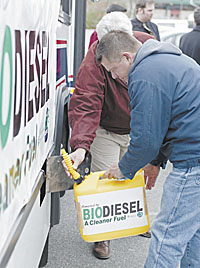For more archives, go to the Advance Archive/Search Page.
Out of the Frying Pan, into the Gas Tank
 |
Gerry Bailey, from the UConn motor pool, pours biodiesel fuel made from an environmentally friendly mix that includes waste cooking oil into a shuttle bus, before a test run on Nov. 12. |
Photo by Tina Covensky
|
For Gregory Magoon and Joanne Domka, Professor Joseph Helble’s offer was one they couldn’t refuse: give up part of their summer and fall, and they could effectively turn a sow’s ear into a silk purse.
Or, more accurately, turn waste cooking oil into fuel.
After spending about six months in the lab, attending national conferences, researching other campuses, and doing the hands-on work, the project has come to fruition. On Nov. 12, a UConn shuttle bus – powered in part by the biodiesel fuel the students made – brought University President Philip E. Austin and other members of the University’s Building and Grounds Committee from North Hillside Road to the Depot Campus. Without stalling.
The bus, a standard 30-passenger campus shuttle bus, was powered with B-20, a fuel mixture composed of 20 percent biodiesel fuel, produced using about 10 gallons of waste cooking oil from the dining halls on campus. Combined with 80 percent diesel, the resultant formula produced a bus trip that emitted fewer hydrocarbons and greenhouse gases into the Storrs air; made use of a cooking byproduct that UConn pays a private company to remove; and, if used regularly, will act like a detergent, helping clean the bus engine as it flows through the system, making it more efficient.
“I really enjoyed the test run,” said Magoon, a junior in the Honors Program who bottled the brew of waste cooking oil and methane that partially powered the bus. “It was the culmination of all my work during the summer, all going into the gas tank.”
Domka, a graduate student who in May earned her bachelor’s degree in chemical engineering, said she enjoyed working on a project that has a direct application to the University campus. “It was a very interesting project,” she said. “It was much more meaningful than the theoretical research we usually conduct.”
The project was funded through a $15,000 grant from the Provost’s Office. Magoon also received funding from the Summer Undergraduate Research Fund.
After the morning demonstration and test, the bus was parked at the top of Fairfield Way, where students from the EcoHusky Program, along with Magoon and Domka, distributed material regarding biodiesel fuel and other environmentally friendly programs, as well as plates of french toast sticks – one of the foods available in the dining halls that produce the waste cooking oil used in the fuel.
UConn’s dining halls generate about 4,000 gallons of waste cooking oil every year, and the University pays to have it removed, said Gerry Weller, director of dining services. Besides biodiesel fuel, the oil is most often used by cosmetic companies – waste cooking oil is a key ingredient in, among other things, lipstick.
Richard Miller, director of the Office of Environmental Policy, said that several universities have recently begun to power their buses with biodiesel, but they buy the vegetable-based fuel.
“Harvard and Colorado run their buses on biodiesel,” he said, “but we’re the only ones with students making it, using it, and researching it, learning to deal with the regulations, building codes, larger tanks, and designing a lab.”
He added that the project shows the University is serious about the campus environmental policy approved in April. Not only did funding from the Provost’s Office enhance an environmentally friendly academic study and give two students an opportunity to perform research, it also showed policy makers – at UConn and in the state – that there are better, and less expensive, ways to power public transportation. The effort also helps UConn meet the Climate Change Action Plan commitment, signed by Austin and the presidents of the other New England land grant colleges in 2003.
Helble, a professor and head of the chemical engineering department, said he would like to continue the project, incorporating the development of biodiesel fuel as part of the department’s educational program and, hopefully, dedicating a laboratory to the project. He said the next step is to continue researching biodiesel, and “optimizing the chemistry” of turning waste cooking oil into fuel. Eventually, the biodiesel fuel could be used more often.
All it takes is a little know-how and some bright students. And a lot of french fries.

